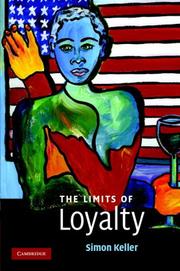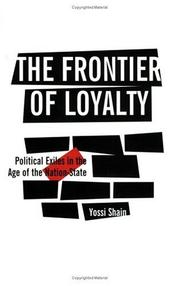| Listing 1 - 10 of 16 | << page >> |
Sort by
|
Book
ISBN: 0814760910 9780814760918 9780814737897 0814737897 9780814785935 081478593X Year: 2013 Publisher: New York, NY
Abstract | Keywords | Export | Availability | Bookmark
 Loading...
Loading...Choose an application
- Reference Manager
- EndNote
- RefWorks (Direct export to RefWorks)
Few topics are more ubiquitous in everyday life and, at the same time, more controversial in practice, than that of one’s moral obligation to loyalty. Featuring essays by scholars working in a variety of subjects from law to psychology, Loyalty presents diverse perspectives on dilemmas posed by potential conflicts between loyalties to specific institutions or professional roles and more universalistic conceptions of moral duty. The volume begins with a philosophical exploration of theories of loyalty, both Eastern and Western, then moves to examine several problematic situations in which loyalty is often a factor: partisan politics, the armed forces, and lawyer-client relationships. A fair and balanced analysis from a wide range of disciplinary and normative viewpoints, Loyalty infuses new life into an oft-tread avenue of scholarly inquiry. Contributors: Ryan K. Balot, Paul O. Carrese, Yasmin Dawood, Bernard Gert, Kathleen M. Higgins, Sanford Levinson, Daniel Markovits, Lynn Mather, Russell Muirhead, Nancy Sherman, Paul Woodruff
Loyalty. --- Conduct of life --- Constancy

ISBN: 9780521152877 9780521874618 9780511487590 9780511355646 0511355645 0511487592 0521874610 0521152879 1107181720 9781107181724 1281153427 9781281153425 9786611153427 661115342X 1139132849 9781139132848 0511355122 9780511355127 0511354584 9780511354588 0511354002 9780511354007 Year: 2007 Publisher: Cambridge Cambridge university press
Abstract | Keywords | Export | Availability | Bookmark
 Loading...
Loading...Choose an application
- Reference Manager
- EndNote
- RefWorks (Direct export to RefWorks)
We prize loyalty in our friends, lovers and colleagues, but loyalty raises difficult questions. What is the point of loyalty? Should we be loyal to country, just as we are loyal to friends and family? Can the requirements of loyalty conflict with the requirements of morality? In this book, originally published in 2007, Simon Keller explores the varieties of loyalty and their psychological and ethical differences, and concludes that loyalty is an essential but fallible part of human life. He argues that grown children can be obliged to be loyal to their parents, that good friendship can sometimes conflict with moral and epistemic standards, and that patriotism is intimately linked with certain dangers and delusions. He goes on to build an approach to the ethics of loyalty that differs from standard communitarian and universalist accounts. His book will interest a wide range of readers in ethics and political philosophy.
General ethics --- Loyalty --- Conduct of life --- Constancy --- Loyalty. --- Respect. --- Deference --- Esteem --- Arts and Humanities --- Philosophy
Book
ISBN: 9781626185739 1626185735 9781626185722 1626185727 Year: 2013 Publisher: New York
Abstract | Keywords | Export | Availability | Bookmark
 Loading...
Loading...Choose an application
- Reference Manager
- EndNote
- RefWorks (Direct export to RefWorks)
Loyalty. --- Conduct of life. --- Ethics, Practical --- Morals --- Personal conduct --- Ethics --- Philosophical counseling --- Conduct of life --- Constancy
Book
ISBN: 1282003135 9786612003134 1442673281 Year: 1997 Publisher: Toronto, [Ontario] ; Buffalo, [New York] ; London, [England] : University of Toronto Press,
Abstract | Keywords | Export | Availability | Bookmark
 Loading...
Loading...Choose an application
- Reference Manager
- EndNote
- RefWorks (Direct export to RefWorks)
In response to the crisis provoked by the Wars of Religion in Europe in the sixteenth century, the Flemish philosopher Lipsius developed a synthesis of stoic morality and Tacitean political analysis called 'the Lipsian paradigm,' or neostoicism. The paradigm espoused the adaptation to prevailing political circumstances, the practice of 'mixed prudence,' (knowing the circumstances in which to apply deceit) and the use of historical example as a guide to contemporary action as political virtues.Constant Minds investigates the reception and use of Lipsian ideas in the moral, political, and literary culture of late-sixteenth- and early-seventeenth-century England through examination of the writings and activities of Walter Ralegh, Francis Bacon, Fulke Greville, Ben Jonson, and Joseph Hall. Adriana McCrea demonstrates how this continental school of thought permeated the political ideas of these English writers, and places her study in the contexts of the literary conventions of the humanist tradition, the political events of the time, and the activities and circles of the authors themselves. McCrea's study fuses intellectual history with political history and literary analysis, prompting new questions about the nature of English Renaissance humanism and political perception in England during the early modern period.
Philosophy, English --- Stoics. --- Constancy. --- Virtue. --- Political science --- Philosophy. --- Lipsius, Justus, --- Influence. --- England --- Intellectual life --- Neo-Stoicism
Book
ISBN: 1474480861 1474454224 1474454194 Year: 2020 Publisher: Edinburgh : Edinburgh University Press,
Abstract | Keywords | Export | Availability | Bookmark
 Loading...
Loading...Choose an application
- Reference Manager
- EndNote
- RefWorks (Direct export to RefWorks)
Through several historical case studies from the last 300 years, Luis de Miranda shows how the phrase 'esprit de corps' acts as a combat concept with a clear societal impact. He also reveals how interconnected, yet distinct, French, English and American modern intellectual and political thought is.
Combat --- Loyalty --- Conduct of life --- Constancy --- Fighting --- Military combat --- Dueling --- Wager of battle --- Social aspects --- Political aspects
Book
Abstract | Keywords | Export | Availability | Bookmark
 Loading...
Loading...Choose an application
- Reference Manager
- EndNote
- RefWorks (Direct export to RefWorks)
Starting from psychophysics, over the last 50 years, most progress in unravelling the mechanisms of color vision has been made through the study of single cell responses, mainly in LGN and striate cortex. A similar development in the study of form perception may seem to be underway, centred on the study of temporal cortex. However, because of the combinatorial characteristics of form perception, we are also observing the opposite tendency: from single-cell activity to population coding, and from static receptive field structures to system dynamics and integration and, ultimately, a synthetic form of psychophysics of color and form perception. From single cells to system integration: it is this development the present Research Topic wishes to highlight and promote. How does this development affect our views on the various attributes of perception? In particular, we are interested in to what extent evolving knowledge in the field of color perception is relevant within a developing integrative framework of form perception. The goal of this Research Topic is to bring together experimental research encompassing both color and form perception. For this volume, we planned a broad scope of topics – on color in complex scenes, color and form, as well as dynamic aspects of form perception. We expect that the Research Topic will be attractive to the community of researchers whose work straddles the boundary between the two visual perception fields, as well as to the wider community interested in integrative/systems neuroscience.
Color-shape association --- Form --- Color --- integration --- distributed spatio-chromatic processing --- Physiology --- 3D object color constancy --- filling-in --- segregation --- Psychophysics --- population coding
Book
ISBN: 0199683123 130630038X 0191763187 0191505633 0191505641 9780199683123 Year: 2014 Publisher: Oxford : Oxford University Press,
Abstract | Keywords | Export | Availability | Bookmark
 Loading...
Loading...Choose an application
- Reference Manager
- EndNote
- RefWorks (Direct export to RefWorks)
The principle of loyalty requires the EU and its Member States to co-operate sincerely towards the implementation of EU law. Under the principle, the European courts have developed significant public law duties on States to deepen the reach of EU law. This text presents a full-length analysis of the loyalty principle and its legal implications.
Constitutional law -- European Union countries. --- International and municipal law --- Constitutional law --- Loyalty --- Law - Non-U.S. --- Law, Politics & Government --- Law - Europe, except U.K. --- Political aspects --- Conduct of life --- Constancy --- Loyalty.

ISBN: 1282593897 9786612593895 0472026127 9780472026128 9780472030422 0472030426 0819552232 9780819552235 9781282593893 661259389X Year: 2005 Publisher: Ann Arbor : University of Michigan Press,
Abstract | Keywords | Export | Availability | Bookmark
 Loading...
Loading...Choose an application
- Reference Manager
- EndNote
- RefWorks (Direct export to RefWorks)
Loyalty. --- Exiles --- Governments in exile. --- Refugee governments --- International law --- International relations --- Sovereignty --- State, The --- Persons --- Aliens --- Deportees --- Refugees --- Conduct of life --- Constancy --- Political activity. --- Governments in exile --- Allegiance --- Exilés --- Gouvernements en exil --- Allégeance

ISBN: 9780387713670 0387713670 1441943951 9786611042844 1281042846 0387713689 9781441943958 Year: 2007 Publisher: [S.l.] : Springer Verlag,
Abstract | Keywords | Export | Availability | Bookmark
 Loading...
Loading...Choose an application
- Reference Manager
- EndNote
- RefWorks (Direct export to RefWorks)
Loyalty is a concept that is invoked as part of nearly all human interaction “ yet it remains disturbingly under-theorised. In this ground-breaking and innovative book the concept of loyalty is explored through a sociology of emotions framework and it is demonstrated that loyalty is an emotion. In establishing that loyalty is an emotion on a par with the likes of trust, hope and shame the author explores a range of theoretical models of emotion and how they might apply to loyalty. A sociological view offers the best means to explore such a diffuse, yet specific, phenomenon like loyalty. The author demonstrates that loyalty helps to guide action, furnish identity, operates at various layers and requires the existence of competing loyalties. This is shown through a series of diverse case studies that incorporate macro- and micro-sociological examples. The case studies begin with national loyalties, where the author explores how actors profess loyalty to a nation in times of war and how immigrants establish a national loyalty. Then it moves onto familial loyalty, including the challenges of step, blended and pseudo-family, to show how loyalty functions. Sporting loyalty is explored next, and how this connection to a team can infuse an actor's actions. The case studies are concluded by an investigation of cultural representations of loyalty. This book is ground-breaking in that it takes an under-theorised concept “ loyalty and explains it. It is innovative as it applies a new methodological approach “ a sociology of emotions framework and demonstrates that loyalty is an emotion. Further, the book connects macro-sociological events (such as war) to an actor's emotional state and reveals the role macro-emotions play in the life of the individual. This book is a must for anyone interested in emotions or anyone that needs to understand loyalty.
Loyalty. --- Emotions --- Loyauté --- Sociological aspects. --- Aspect sociologique --- Emotions -- Sociological aspects. --- Loyalty --- Social Change --- Ethics --- Sociology & Social History --- Philosophy --- Philosophy & Religion --- Social Sciences --- Sociological aspects --- Loyauté --- EPUB-LIV-FT LIVSOCIA SPRINGER-B --- Sociology of emotions --- Social sciences. --- Sociology. --- Social Sciences. --- Sociology, general. --- Sociology --- Conduct of life --- Constancy --- Social theory --- Social sciences --- Behavioral sciences --- Human sciences --- Sciences, Social --- Social science --- Social studies --- Civilization
Book
ISBN: 0813218977 9780813218977 9780813217901 0813217903 Year: 2010 Publisher: Washington, D.C. Catholic University of America Press
Abstract | Keywords | Export | Availability | Bookmark
 Loading...
Loading...Choose an application
- Reference Manager
- EndNote
- RefWorks (Direct export to RefWorks)
Ethics in literature. --- Constancy in literature. --- Austen, Jane, --- Ao-ssu-ting, --- Ao-ssu-ting, Chien, --- Aosiding, --- Aosiding, Jian, --- Āsṭin̲, Jēn̲, --- Austenová, Jane, --- Osten, Dzheĭn, --- Ostin, Dzhein, --- Lady, --- Author of Sense and Sensibility, --- Остен, Джейн, --- Остен, Джейм, --- אוסטן, ג׳יין --- אוסטן, ג׳יין, --- أوستن، جين، --- Hall, Willis, --- Ethics.
| Listing 1 - 10 of 16 | << page >> |
Sort by
|

 Search
Search Feedback
Feedback About UniCat
About UniCat  Help
Help News
News